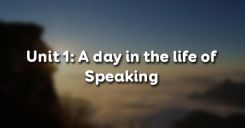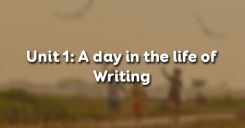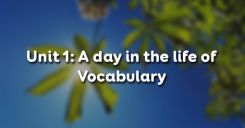Bài học Reading Unit 1 lớp 10 - A day in the life of .... hướng dẫn các em một số kỹ năng đọc hiểu với nội dung bài đọc xoay quanh hoạt động trong cuộc sống đời thường. Với đề tài quen thuộc, hi vọng các em rèn luyện kỹ năng đọc của mình hiệu quả nhất.
Tóm tắt bài
1. Before You Read Unit 1 Lớp 10
Work in pairs. Ask and answer questions about your daily routine, using the cues below. (Làm việc theo cặp. Hỏi và trả lời các câu hỏi về những việc làm thường ngày của em, sử dụng gợi ý bên dưới.)
- what time you go to school/ have breakfast/ lunch/ dinner/ go to bed
- what you often do in the morning/ afternoon/ evening
Guide to answer
A: What time do you often go to school?
B: I often go to school at 6.30.
A: What time do you often have breakfast?
B: I often have breakfast at 6.
A: What do you often do in the morning?
B: I go to school.
A: What do you often do in the afternoon?
B: I often do my homework.
Bài dịch hội thoại
A: Bạn thường đến trường lúc mấy giờ?
B: Tôi thường đến trường lúc 6 giờ 30.
A: Bạn thường ăn sáng lúc mấy giờ?
B: Tôi ăn sáng lúc 6 giờ.
A: Bạn thường làm gì vào buổi sáng?
B: Tôi đến trường học
A: Bạn thường làm gì vào buổi chiều?
B: Tôi thường làm bài tập về nhà.
2. While You Read Unit 1 Lớp 10
Read the passage and then do the tasks that follow. (Đọc đoạn văn và sau đó làm các bài tập theo sau.)
2.1. Unit 1 Lớp 10 Reading Task 1
Choose the option A, B, or C that best suits the meaning of the italicized word(s). (Chọn phương án A, B, hoặc C sao cho sát nghĩa với từ in nghiêng nhất.)
1. The alarm goes off at 4:30. (Đồng hồ báo thức lúc 4 giờ 30.)
A. goes wrong B. goes away C. rings
2. It takes me 45 minutes to get ready. (Tôi mấy 45 phút để chuẩn bị.)
A. to go B. to wake up C. to prepare
3. We chat about our work. (Chúng tôi tán gẫu về công việc.)
A. talk in a friendly way B. learn C. discuss
4. We are contented with what we do. (Chúng tôi hài lòng về những gì mình đã làm.)
A. satisfied B. disappointed with C. interested in
Guide to answer
1-C ; 2-C ; 3-A ; 4-A
2.2. Unit 1 Lớp 10 Reading Task 2
Answer the following questions. (Trả lời các câu hỏi sau.)
1. What is Mr. Vy's occupation? (Nghề nghiệp của ông Vy là gì?)
2. What time does he get up and what does he do after that? (Ông ấy thức dậy lúc mấy giờ và làm gì sau đó?)
3. What does he do in the morning? (Ông ấy làm gì vào buổi sáng?)
4. What do Mr. Vy and his wife do in the afternoon? (Ông Vy và vợ làm gì vào buổi chiều?)
5. Are they happy with their lives or not? Why? (Họ hạnh phúc hay không hạnh phúc với cuộc sống của mình không? Tại sao?)
Guide to answer
1. He's a peasant/ farmer. (Ông ấy là một người nông dân.)
2. He gets up at 4:30 and goes down to the kitchen to boil some water for his early tea. (Ông ấy thức dậy lúc 4 giờ 30 và bước xuống giường để đun nước chuẩn bị pha trà.)
3. He ploughs and harrows his plot of land, drinks tea and smokes local tobacco with his fellow peasants during his break. (Ông ấy đi cày, bừa mảnh ruộng, uống trà và hút thuốc với những ông bạn nông dân khác của mình suốt giờ nghỉ.)
4. In the afternoon, Mr. Vy and his wife repair the banks of their plot of land. Mr. Vy pumps water into while his wife does the transplanting. (Vào buổi chiều, ông Vy và vợ đắp bờ cho ruộng. Ông Vy bơm nước vào ruộng trong khi vợ ông cấy lúa.)
5. Yes, they are. Because they love working and they love their children, too. (Họ hạnh phúc với cuộc sống hiện tại. Bởi vì họ yêu công việc và con cái của mình.)
2.3. Unit 1 Lớp 10 Reading Task 3
Scan the passage and make a brief note about Mr. Vy and Mrs. Tuyet's daily routines. Then compare your note with a partner. (Đọc lướt đoạn văn và ghi chú vắn tắt về công việc thường làm hằng ngày của ông Vy và bà Tuyết. Sau đó so sánh bảng ghi chú của em với bạn cùng học.)
Guide to answer
| in the morning |
|
| in the afternoon |
|
| in the evening |
|
3. After You Read Unit 1 Lớp 10
Work in groups. Talk about Mr. Vy and Mrs. Tuyet's daily routines. (Làm việc theo nhóm. Hãy nói về công việc hàng ngày của ông Vy và bà Tuyết.)
Guide to answer
Mr Vy and Mrs Tuyet are farmers. They get up early, at 4:30 a.m. They work hard on their plot of land, usually from 5:30 a.m. till 6 p.m. Mr Vy usually takes an hour's rest after lunch.
After dinner, they watch TV and go to bed at about 10 p.m. Sometimes, they visit their neighbors and chat about their work, their children and their plan for the next crop. They love working and they love their children as well.
4. Phần dịch bài Reading Unit 1 Lớp 10
Ông Vy: Đồng hồ báo thức reo lúc 4 giờ 30. Tôi thức dậy và xuống bếp đun nước cho buổi trà sáng. Tôi uống vài tách trà, ăn điểm tâm nhanh và sau đó dẫn trâu ra đồng. Tôi mất 45 phút để chuẩn bị. Tôi rời khỏi nhà lúc 5 giờ 15 và đến ruộng đúng 5 giờ 30. Tôi cày và bừa thửa đất của tôi, và lúc 7 giờ 45 tôi nghỉ một tí. Trong lúc nghỉ, tôi thường uống trà với các bạn nông và hút thuốc lào. Tôi tiếp tục làm việc từ 8 giờ 15 cho đến 10 giờ 30. Sau đó tôi về nhà nghỉ ngơi một tí và ăn trưa với gia đình lúc 11 giờ 30. Sau bữa trưa, tôi thường nghỉ một giờ.
Bà Tuyết: Lúc 2 giờ 30 chiều, chúng tôi ra đồng một lần nữa. Chúng tôi sửa bờ cho các mảnh ruộng. Sau đó chồng tôi bơm nước vào ruộng trong khi tôi cấy lúa. Chúng tôi làm việc khoảng hai giờ trước khi chúng tôi nghỉ. Chúng tôi làm xong công việc lúc 6 giờ. Chúng tôi ăn tối lúc khoảng 7 giờ, sau đó xem tivi và đi ngủ lúc khoảng 10 giờ. Đôi khi chúng tôi sang nhà hàng xóm để uống trà. Chúng tôi tán gẫu về công việc, con cái và kế hoạch cho vụ mùa tới. Dù ngày có dài nhưng chúng tôi hài lòng với công việc đã làm. Chúng tôi yêu lao động và yêu thương con cái mình.
Bài tập minh họa
Exercise: Read the following text and choose the best answer
ROUTINES
Think about your daily life. Do you follow the same read :o work every day? Do you sit in the same place in class? When you get dressed, do you always put the same leg or arm in first? You probably do, because we all have routines in our lives.
Routines save time and energy because you do them without thinking, that's why they are so important in the morning when your brain isn't active. Here's Jo talking about her morning routine.
'Oh yes. I always do exactly the same things. 1 wake up at seven o'clock every morning, but I don't get quarter past seven. I switch on the radio and listen to the news. Then I go to the too and I brush my- teeth. I have a shower and dry my hair. Then I choose my clothes and I get dressed. I don't eat anything for breakfast. I just have a cup of coffee. Then I go to work. Yes, it's always the same.'
Routines are very useful. but they also make you uncreative. So sometimes it's a good idea to break your routines. Get out of bed on the opposite side. Listen to a different radio station. Take a different route to work. Eat something different for breakfast. Change your routine. You never know, it could change your life.
1. This passage is mainly concerned with .................
a. our usual ways of doing things b. our daily activities
c. Jo's timetable d. changes in our lives
2. According to the passage, routines are useful because................
a. we can do them in the morning b. they make a habit of never thinking
c. they save time and energy d. we all have them in our lives
3. The word 'loo' in line 9 can best be replaced with ................
a. balcony b. bedroom c. sink d. toilet
4. What is the main disadvantage of routines?
a. Routines make us unable to create things or to have new ideas.
b. Routines may change our life.
c. Routines make a habit of never thinking before doing.
d. Routines make us do the same things day after day.
5. Which of the sentences is true?
a. Routines make our brain creative.
b. People who have routines are unable to think.
c. We shouldn't break our routines.
d. Our lives could be changed if we change our routines.
Key
| 1 | 2 | 3 | 4 | 5 |
| a | c | d | a | d |
Bài tập trắc nghiệm Reading Unit 1
Trên đây là nội dung bài học Reading Unit 1 tiếng Anh lớp 10
Bên cạnh bài học này HỌC247 còn biên soạn bài tập Trắc nghiệm Unit 1 lớp 10 Reading giúp các em rèn luyện thêm khả năng đọc hiểu.
-
Câu 1: Choose the one option - a, b, c or d - that best fits each of the numbered blank.
David Evans is a farmer. He does farming on his own land in Wales. The farm has (1).............. his family for generations. The soil is poor. David (2)................ sheep on his land. He does not employ (3)................ fulltime workers. His sons help him when they are not (4)........... school. His wife adds to the family income by (5) ............... eggs which her hens produce. In summer she often (6) ............... paying guests into the farmhouse. The guests from the city enjoy their quiet holiday in the clean country (7)............... and Mrs. Evans enjoys having some (8).............. money to spend on clothes for her children and herself. However, it is a lonely life for the Evans family when the guests have gone. The question is that if his children want to (9) ............... the farm when Mr. Evans gives up working. Country life is quiet and (10) ............... to them. It is quite likely that they will leave the farm for the city some day.
(1) ....................
- A. been to
- B. belonged to
- C. possessed
- D. depended on
-
Câu 2:
(2) ....................
- A. feeds
- B. grows
- C. raises
- D. leads
-
Câu 3:
(3) ....................
- A. some
- B. more
- C. much
- D. any
Câu 4-10: Mời các em đăng nhập xem tiếp nội dung và thi thử Online để củng cố kiến thức về bài học này nhé!
Hỏi đáp Reading Unit 1 Lớp 10
Ngoài ra, trong quá trình học có vấn đề gì thắc mắc mời các em đặt câu hỏi trong mục Hỏi đáp để được hỗ trợ từ cộng đồng.
Chúc các em học tốt và đạt kết quả cao!
-- Mod Tiếng Anh 10 HỌC247












